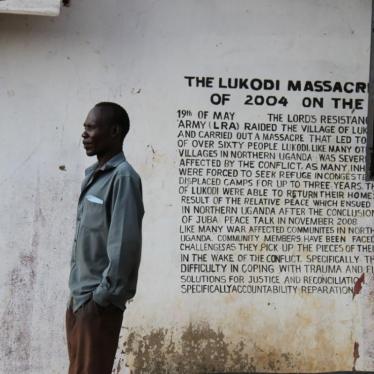(New York) - The Bush Administration's decision to effectively withdraw the U.S. signature from the treaty establishing the International Criminal Court is an empty gesture that will further estrange Washington from its closest allies, Human Rights Watch said today in a letter.
In an unprecedented diplomatic maneuver, Under Secretary of State Marc Grossman is expected to announce today that the Bush administration does not consider itself bound by President Clinton's December 31, 2000 signature on the treaty to create a permanent war crimes tribunal.
"The administration is putting itself on the wrong side of history," said Kenneth Roth, executive director of Human Rights Watch. "'Unsigning' the treaty will not stop the court. It will only throw the United States into opposition against the most important new institution for enforcing human rights in fifty years."
The International Criminal Court treaty has already received more than the requisite number of 60 ratifications, and its jurisdiction will commence after July 1, 2002, with or without the U.S. signature. The court will try people accused of genocide, crimes against humanity, and war crimes. All of Western Europe and virtually every major U.S. ally are strong supporters of the court. The only states still actively opposing the court are the United States and Libya.
The U.S. government has said that it fears U.S. servicemembers or officials could be brought before the court in politically motivated cases. But the International Criminal Court will only take on cases that national courts are demonstrably unable or unwilling to prosecute. The treaty for the court includes numerous safeguards to protect against frivolous or unwarranted prosecutions. The key, said Roth, is to ensure that they are applied conscientiously.
"U.S. disengagement from the court will squander U.S. influence on some critical issues that this fledgling court is facing," said Roth. "We see here a triumph of ideology over any rational assessment of how to combat the worst human rights crimes."
In a May 3 letter to President George W. Bush, Roth urged him not to "unsign" the treaty, saying that such an action could come back to haunt Washington if it encourages governments around the world to "unsign" other treaties that they have not yet ratified.
The renunciation of U.S. signature appears certain to aggravate relations with the European Union and the emerging democracies who are among the court's strongest supporters. Many states that have made the transition from dictatorship to democracy, such as South Africa and Argentina, have already ratified the treaty and view the court as an important insurance policy against retrenchment.
In June 2001, the E.U. issued a Common Position expressing full support for the early establishment of the International Criminal Court, and encouraging the Bush administration to cooperate with the court. Other than the United States, 138 governments have signed the treaty and 66 have ratified it.
"The timing of this decision couldn't be worse for Washington," said Roth. "It puts the Bush Administration in the awkward position of seeking law-enforcement cooperation in tracking down terrorist suspects while opposing an historic new law-enforcement institution for comparably serious crimes."
|
News Release
United States "Unsigning" Treaty on War Crimes Court
Your tax deductible gift can help stop human rights violations and save lives around the world.
Region / Country
Most Viewed
-
December 15, 2024
Sudan: Fighters Rape Women and Girls, Hold Sex Slaves

-
April 22, 2025
UAE: Dissidents, Relatives Designated ‘Terrorists’

-
November 8, 2017
“Everyone Blames Me”

-
August 29, 2024
South Korea’s Digital Sex Crime Deepfake Crisis

-
October 1, 2020
Egypt: Security Forces Abuse, Torture LGBT People


